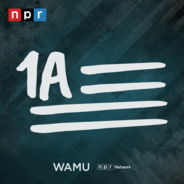President Donald Trump promised tariffs on the campaign trail. Those tariffs are here – but how much of them, where, and on who, has changed a few times.Here's where things stand right now: President Trump rolled tariff rates back to a baseline ten percent for most countries, but raised the tariffs on China to 145 percent. Global trading markets plunged due to a series of rapid shifts in trade policy. We discuss how these policies affect small businesses, many of which have to rely on goods that come from other countries. Want to support 1A? Give to your local public radio station and subscribe to this podcast. Have questions? Connect with us. Listen to 1A sponsor-free by signing up for 1A+ at plus.npr.org/the1a.Learn more about sponsor message choices: podcastchoices.com/adchoicesNPR Privacy Policy

Nachrichten
1A Folgen
Listening to the news can feel like a journey. But 1A guides you beyond the headlines – and cuts through the noise. Let's get to the heart of the story, together – on 1A.Support NPR and get your news sponsor-free with 1A+. Learn more at plus.npr.org/the1a
Folgen von 1A
299 Folgen
-
Folge vom 17.04.2025The Effect Of Tariffs On Small Businesses
-
Folge vom 16.04.2025How Did This Get Here: Your CoffeeThe last few weeks have had many of us thinking long and hard about the things we buy, the price of those goods, and the potential for those prices to jump. This episode is part of our series, "How Did This Get Here?", where we follow goods as they make their way through the global supply chain, and explore what the president's announced tariffs may mean for your pocketbook. Today, we continue our series with.a product some of you may be sipping on right now. It's coffee. Coffee is everywhere. The average person in the U-S drinks a bit more than 3 cups a day. And Americans spend almost 100 and 10 billion dollars every year on the drink. And that amount is going up. Perhaps you've noticed the price for your favorite brand jumped in recent months? The average price of ground coffee in the supermarket hit an all-time high in March, at 7 dollars 38 cents a pound. That's up 84 percent since just before the pandemic. We discuss what's behind the jump. And what tariffs...and the warming climate...mean for your favorite cup of joe.Want to support 1A? Give to your local public radio station and subscribe to this podcast. Have questions? Connect with us. Listen to 1A sponsor-free by signing up for 1A+ at plus.npr.org/the1a.Learn more about sponsor message choices: podcastchoices.com/adchoicesNPR Privacy Policy
-
Folge vom 15.04.2025Tax Day: Checking In On The IRSFrustration with the Internal Revenue Service is nothing new. A Pew Research survey found it's the least popular federal agency among Americans.But that should come as no surprise. After all, the IRS is responsible for collecting what we owe the government. During fiscal year 2024, the IRS collected more than $5 trillion in tax revenue. But this year, Tax Day arrives amid upheaval at the agency. Just last week, the head of the IRS resigned – the third to do so since President Trump's inauguration. And his administration announced plans to lay off up to a quarter of the agency's workforce. We discuss the latest at the IRS and the impact changes at the agency could have for the 2025 tax season.Want to support 1A? Give to your local public radio station and subscribe to this podcast. Have questions? Connect with us. Listen to 1A sponsor-free by signing up for 1A+ at plus.npr.org/the1a.Learn more about sponsor message choices: podcastchoices.com/adchoicesNPR Privacy Policy
-
Folge vom 15.04.2025ICYMI: The Upcoming Budget Cuts At NOAAWhat's the weather like in your area? Chances are you took a look at your preferred weather app on your phone before heading outside.We can find that information easily because of weather data that comes from the National Weather Service. It's a part of the federal agency NOAA, the National Oceanic and Atmospheric Administration.The Trump Administration plans to cut billions of dollars from NOAA in its upcoming 2026 budget plans. The cuts could result in a remaking of the agency and eliminate much of the research it conducts that Americans use every day.We discuss how the loss of NOAA could affect our day to day.Want to support 1A? Give to your local public radio station and subscribe to this podcast. Have questions? Connect with us. Listen to 1A sponsor-free by signing up for 1A+ at plus.npr.org/the1a.Learn more about sponsor message choices: podcastchoices.com/adchoicesNPR Privacy Policy
